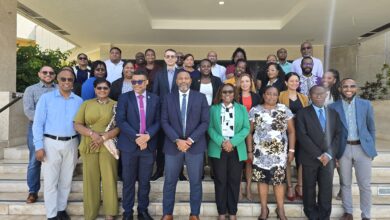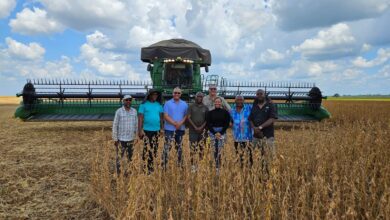(CARICOM Secretariat, Turkeyen, Greater Georgetown, Guyana) CARICOM leaders have called for stocktaking to determine what was working well for the integration movement so that those elements could be retained and improved, while discarding those components that were hindering the Community.
As they addressed the Twenty-Seventh Intersessional Meeting of the Conference of Heads of Government which opened in Placencia, Belize, last Monday evening, Prime Ministers Dean Barrow and Freundel Stuart of Belize and Barbados, respectively, advocated strongly for stock-taking.
The realities of the Community of small states, Prime Minster Barrow stated, forced Member States to acknowledge the limitations of individual smallness and led to collective thinking and action. The Chair of the Community called for less talk and more action, a toning down on rhetoric and heightening of achievement.
“It may mean a lessening of grandiose goals. It may mean long-haul, quotidian grind to achieve incremental accomplishments. Drudgery in the garret rather than flash-in-the-pan brilliance. But the times do seem to require this sort of workmanlike focus to wring from difficult circumstances the kinds of realizable, measurable objectives our people deserve,” Prime Minister Barrow said.
Speaking against the background of the challenging global economic conditions that continue to negatively impact the Region, the CARICOM Chairman called for “a hard-headed assessment of where we are, where we need to go and how we get there”.
“We need to settle on achievable goals for the immediate and medium term, and specify and take the necessary steps for realisation on a time- and-action basis. In the process we may recognise, for example, that there is need for a workaround of the unbridgeable gap between our aspirations for a perfect single market and economy, and individual circumstance and sovereignty constraints. The nimbleness and flexibility that must be deployed to adjust to the changing world circumstances, may themselves militate against the centralised management mechanism that a full CARICOM single economy posits. So that to be driven back to a reliance on the less lofty but more practical virtues of functional cooperation, may be no bad thing,” he said.
He added that the Community needed to focus on “retaining and improving all that has worked”, and intensify those aspects of the CARICOM Single Market and Economy (CSME) “on which we are all fully agreed, and which we are all prepared fully to implement”.
“A more compressed canvas will surely sustain a more concentrated commitment. And that latter is what we as leaders owe to our people and to ourselves,” he told the gathering at the opening ceremony.
Prime Minister Stuart, who preceded Prime Minister Barrow as Chairman of the Community, shared similar views on the future direction the integration movement should take.
“In order for CARICOM to fulfill its immense promise, first we should first look at the strengths of our movement and seek to retain them at all costs; second, we must look backward at important elements that we have lost in the Regional integration movement and seek to reclaim them; third, we must look inward at our movement to carefully identify those aspects that hinder us, which we can discard, and should do so with some urgency.
“We must then look forward to see what new or different measures we need urgently to adopt to ensure that our movement remains both vibrant and relevant in this 21st century, but more importantly, that it remains a sustainable project that continues to meet the needs of the people of the Caribbean,” the Barbados Prime Minister said.





